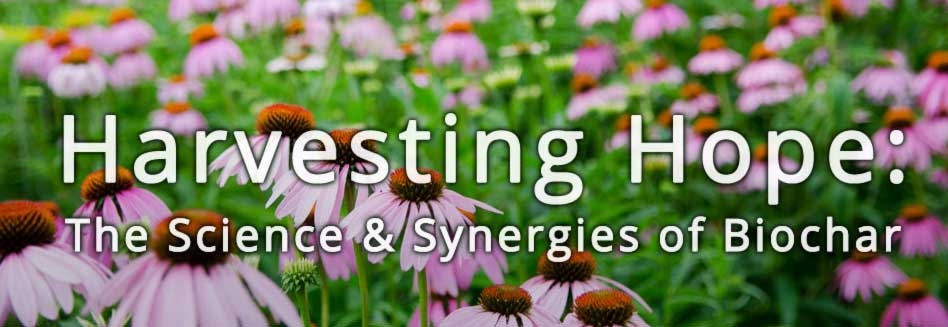2013 USBI North American Biochar Symposium, October 13-16, UMass Amherst
Dr. Tom Goreau will be giving a presentation on the results of the New Harmony Farm CSA Research Project in Newbury, MA which is looking to find the optimum ratios for rock dust and biochar in agriculture. While this research on the most efficacious ratios of compost, rock dust and biochar would be extremely valuable on its own, this study seeks to take the results one step further by analyzing not only plant and soil nutrients and biological activity, but also the effects of this innovative land management technique on soil carbon storage and greenhouse gas emissions. Joanna Campe, Executive Director of RTE will also attend the conference with Dr. Goreau, researcher and RTE board director.
Biochar has the potential to increase crop yields and nutrient value, conserve water, combat climate change, and reduce our dependence on fossil fuels. Yet relatively few people have even heard of biochar, a form of charcoal that can help restore soil carbon, filter stormwater runoff, and reduce greenhouse gasses.
Farmers, foresters, researchers, biochar producers, entrepreneurs, and environmentalists will convene in Amherst, Massachusetts on October 13-16, 2013 to learn more about biochar and share the latest research and application techniques with their peers. The 2013 USBI North American Biochar Symposium, titled “Harvesting Hope: The Science and Synergies of Biochar,” will take place on the UMass Amherst campus and include farm tours and a “carbon negative” banquet of delicious foods grown with the help of biochar. The conference is sponsored by the U.S. Biochar initiative (USBI).
“The biochar industry is turning organic waste into ‘black gold’ for agriculture,” stated conference director, Karen Ribeiro. “Biothermal energy companies are extracting the biochar as a byproduct and selling it. Farmers are enriching their soil by adding biochar. The biochar-conditioned soil is stabilizing soil carbon, which can reverse the carbon build-up in the atmosphere,” she added.
“The biochar movement is heating up,” Ribeiro said. “Biochar producers are reaching a point of profitability. Everyone wants biochar to scale up faster, from the gardener who’s creating their own biochar in a cookstove to companies like Cool Planet Energy Systems, which has attracted investors like BP, Google Ventures, and ConocoPhillips.” She added, “The Symposium is a space where activists and investors can find common ground.”
The conference will feature keynotes by Congressman James McGovern, renowned author Frances Moore Lappe, as well as plenaries with Doris Hamill of NASA Langley, international biochar authority Johannes Lehmann of Cornell University, and author and biofuels producer since 2002, Lyle Estill. Activities will range from an introductory half-day workshop for farmers and gardeners on Sunday, October 13 that is open to the public, to presentations from scientists and researchers from around the globe.
“Expanding the use of biochar can simultaneously help address food security, conserve water, and reduce our dependence on fossil fuel,” said Ted Wysocki, chair of the Pioneer Valley Biochar Initiative, which is hosting the conference. “We need to get more people and companies involved. So in addition to the tracks on the science and benefits of biochar, policy and community engagement, feedstocks and production, we’ve got an entire track focused on scale, sales and marketing,” Wysocki said.
“Attendees won’t just be chewing on information about biochar, they’ll be savoring the delicious local produce grown in biochar-conditioned soil, as well as a variety of meat and beverages enhanced by biochar at the 5pm ‘Biochar Banquet‘ on Monday, October 14, which is open to the public.” Wysocki explained.
The public is also invited to a free Video Lounge featuring TED Talks, feature films, and select YouTube videos on October 14 and 15, from 9am-9pm, and on October 16, from 10am-4pm.
To view the conference schedule, visit http://scholarworks.umass.edu/biochar/2013/.
To register, go to http://symposium2013.pvbiochar.org/register.
USBI Facebook Page: https://www.facebook.com/USBiochar
USBI YouTube Channel: http://youtube.com/USBiochar
PVBI Facebook Group: https://www.facebook.com/groups/PioneerValleyBiocharInitiative/
Conference Facebook Event: https://www.facebook.com/events/160769540777529/?ref=3
Conference Twitter: https://twitter.com/AmericanBiochar
About Biochar
Biochar was historically used for agriculture in Mongolia and most notably, the Amazon and is being rediscovered today because of its enormous potential to clean up pollutants and restore carbon to the soil. biochar is produced when “biomass”—plant and animal-based materials, such as woodchips, cornstalks, manures, and lumber leftovers—is heated without oxygen (pyrolysis). Instead of being released into the atmosphere, 50% of the carbon from the original organic material is converted to energy and 50% is converted to charcoal, which is clean for agricultural use.
When added to the soil, biochar attracts and holds water in the root zone of plants, so less fossil fuel-based fertilizer and water is necessary. Biochar benefits soil by providing excellent conditions for essential soil microbes and fungi. In addition, it improves the soil structure, making it less dense and more resistant to compaction. When combined with organic or chemical fertilizers, biochar enables marginal land to be used for agricultural purposes. And biochar sequesters carbon from biomass that would otherwise decay and release carbon dioxide.
For more information about biochar, visit www.biochar-us.org and www.biocharinternational.org.
About the Organizers
The 2013 USBI North American Biochar Symposium is produced by the U.S. Biochar Initiative (USBI), a not-for-profit organization promoting the sustainable production and use of Biochar through research, policy, technology and doing it! Previous conferences include the 2012 US Biochar Conference in Sonoma, CA, the 2010 US Biochar Conference, University of Iowa, and the 2009 North American Biochar Conference, University of Colorado.
The Symposium is hosted by the Pioneer Valley Biochar Initiative (PVBI) in western Massachusetts. Established in 2006, PVBI is a group of farmers, foresters, professors, students and concerned citizens, promoting public awareness that a growing body of soil science affirms that biochar can increase soil productivity and enhance crop health when incorporated into farm, forest and garden soils. PVBI hosted the 2009 PVBI Northeast Biochar Symposium at UMass Amherst.

